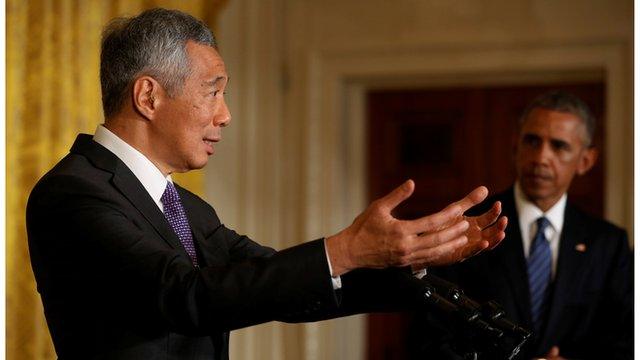What does Trump's no to TPP mean for Asia?
- Published
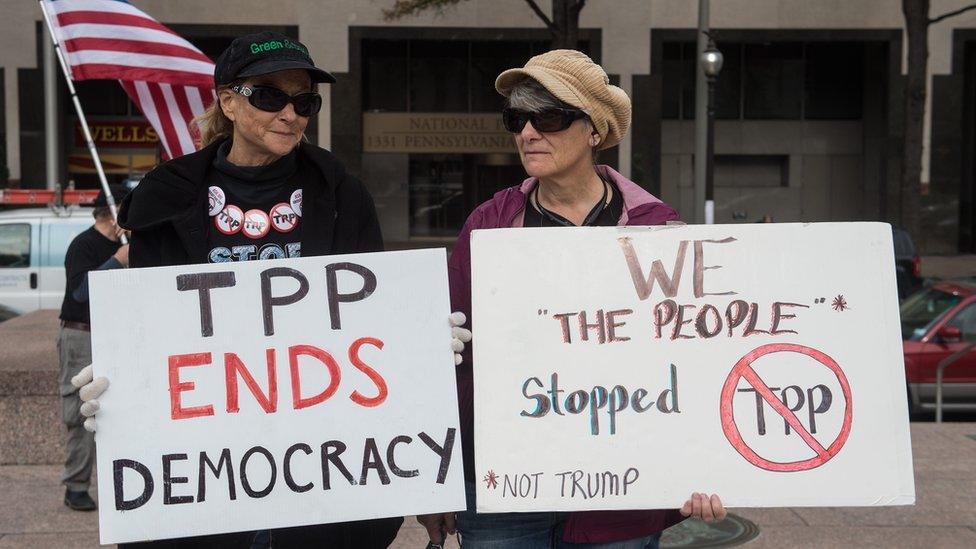
No-one should be surprised by Mr Trump's announcement that the US will quit the Trans-Pacific Partnership trade deal on his first day in the White House in January.
On the campaign trail he regularly said he was against the deal.
So Asian leaders have had some time to prepare for this news - but that is not to say Mr Trump's decision will not sting.
And it may have lasting economic and political repercussions.
Earlier this year, Singapore's Prime Minister Lee Hsien Loong, speaking at the White House, said that "in terms of America's engagement of the region, you have put a reputation on the line" and warned what may happen to the US should it decide to pull out of the agreement., external
"If, at the end, waiting at the altar, the bride doesn't arrive, I think there are people who are going to be very hurt, not just emotionally but really damaged for a long time to come," he said.
It is no wonder that Asian countries are annoyed, to say the least. The demise of the TPP is a "major blow" to economic prospects for emerging Asia, as research house Capital Economics puts it.
Seven Asia-Pacific countries had signed up to the deal - Japan, Singapore, Vietnam, Malaysia, New Zealand, Australia and Brunei - along with the US, Canada, Mexico, Chile and Peru.
What is the TPP and why does it matter?
In simple terms, under the deal, countries would be able to sell their products to one another with low or no tariffs on them.
Tariffs are taxes that nations apply to one another's goods to stop them from becoming too cheap and killing domestic industries. In theory, this would bring down the cost of goods for consumers and allow businesses to access new markets.
But Mr Trump and his supporters say that the TPP hurts American jobs and industry and that the US should sign bilateral trade deals with its partners.
Let's take a look at who stands to lose in Asia from TPP's demise.
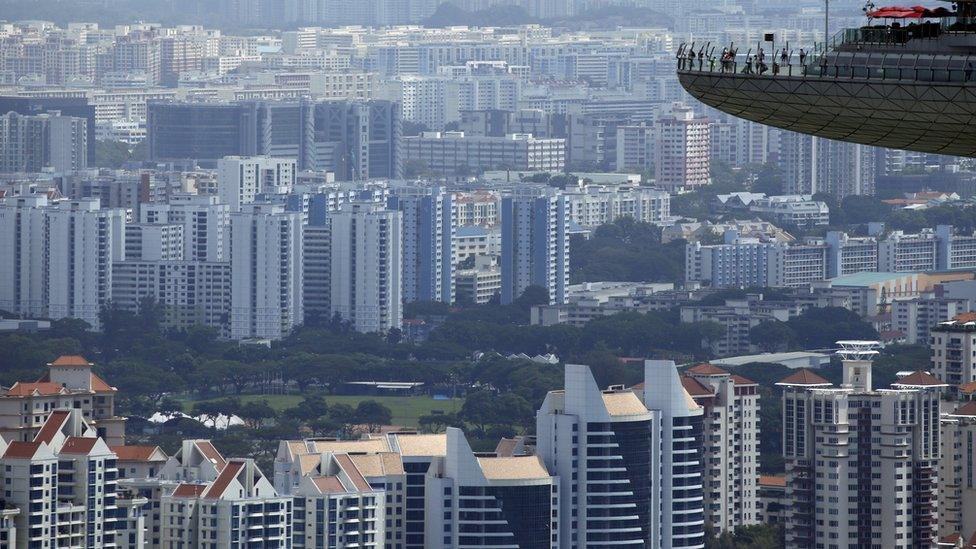
Singapore was hoping to benefit from the TPP
Singapore
Singapore was one of the co-founders of the TPP's predecessor and was a big backer of the deal in the region.
The small island state relies on trade for its economy to grow. It is also home to one of the biggest ports in the region and was hoping to benefit from an increase in services such as shipping and trade financing that it was expecting to see from an increase in regional and global trade.
Vietnam
According to this study by the Petersen Institute,, external Vietnam was expected to benefit the most from the TPP because it is still a relatively closed economy and through this trade deal it would have gained tariff-free access for its rice, seafood, textiles and low-end manufactured goods.
Some estimates say Vietnam could have enjoyed a 10% boost to its economy by 2025 under the TPP.
Malaysia
According to that same Petersen study, Malaysia's economy could have grown by 5.5% in the same period because of the TPP. Under the deal, it was set to get access to the US for its palm oil exports, but at the same time under the rules of the agreement it had to agree to higher international labour standards.
This then was the central premise of the US-backed TPP: join our party, we'll all get rich together and we'll all abide by international standards. Everybody wins.
In another study, the Petersen Institute has outlined, external that the TPP would have created a global annual benefit of $295bn (£236bn) for the world economy.
Benefit for China?
Of course projections are simply that and are often optimistic at best. But even if you take the worst case scenario and go with half that amount, that is still a lot of trade.
Some Asian countries have reacted to Mr Trump's announcement by saying that they will go it alone - but frankly without the biggest player at the party, it is hard to see how it will be a meaningful agreement.
There is one country though that could benefit from the death of the TPP.
As my colleague Carrie Gracie writes, China is well placed to step into the US's global footprint with both its regional trade deal alternative - the Regional Comprehensive Economic Partnership deal - and its massive and expensive One Belt One Road initiative, which aims to build roads, ports and highways through much of Asia.
This is typically the role the US has played in the past few decades in Asia through its financial bodies and global institutions.
According to some analysts, China has been playing what some call the "New Great Game" in Asia - a reference to the power rivalry we saw in the 19th century in Central Asia - and will grab any opportunity it can find to increase its influence in the region.
Mr Trump may have just handed Beijing just the chance for which it has been looking.
- Published23 January 2017
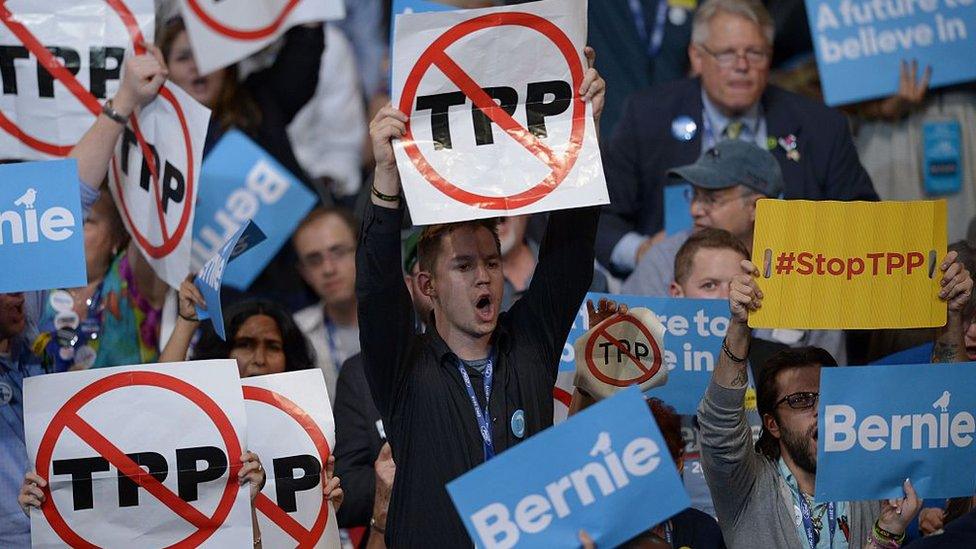
- Published22 November 2016
- Published22 November 2016
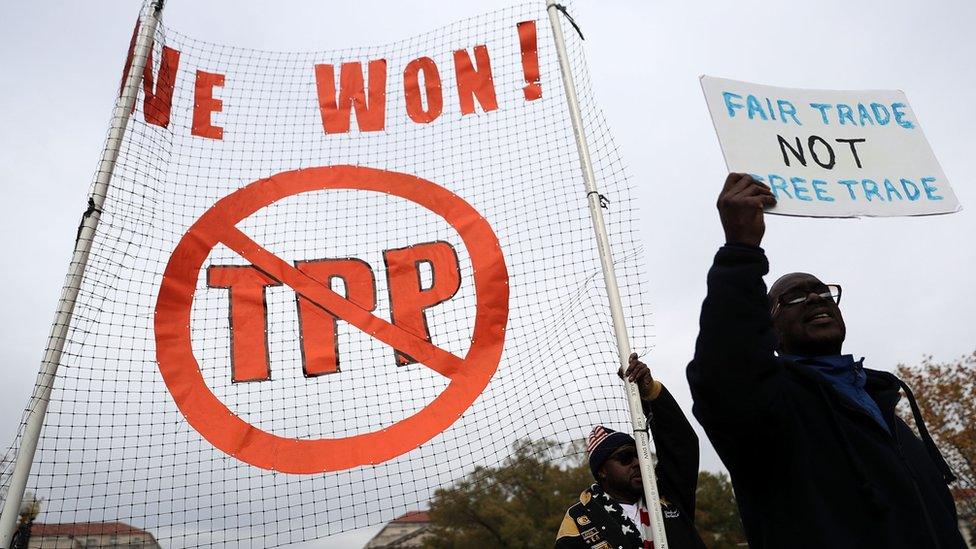
- Published2 August 2016
